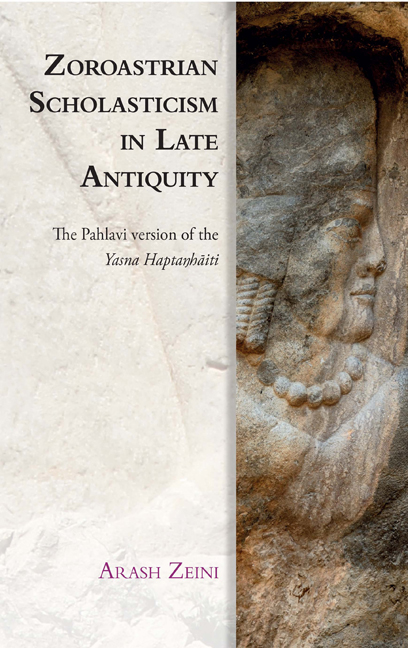Book contents
- Frontmatter
- Contents
- List of Figures
- List of Tables
- Acknowledgements
- Series Editor’s Preface
- Preface
- Conventions
- Abbreviations
- Dedication
- Part I Introduction
- 1 Introduction
- 2 The Zand
- 3 Scholasticism
- 4 Fire in Zoroastrianism
- 5 Precis: Yasn Ī Haft Hād
- Part II Text and translation
- 6 PY 35
- 7 PY 36
- 8 PY 37
- 9 PY 38
- 10 PY 39
- 11 PY 40
- 12 PY 41
- Part III Miscellaneous Observations
- 13 PY
- 14 PY 36
- 15 PY 37
- 16 PY 38
- 17 PY 39
- 18 PY 40
- 19 PY 41
- Part IV Epilogue
- 20 Reflections on the Zand
- Appendices
- Appendix A Transliteration and Apparatus
- Appendix B Y 9.1
- Appendix C Fire in the Older Avesta
- Appendix D Iϑā
- Appendix E MSS Concordance
- Bibliography
- Index of Passages Quoted
2 - The Zand
Published online by Cambridge University Press: 14 October 2020
- Frontmatter
- Contents
- List of Figures
- List of Tables
- Acknowledgements
- Series Editor’s Preface
- Preface
- Conventions
- Abbreviations
- Dedication
- Part I Introduction
- 1 Introduction
- 2 The Zand
- 3 Scholasticism
- 4 Fire in Zoroastrianism
- 5 Precis: Yasn Ī Haft Hād
- Part II Text and translation
- 6 PY 35
- 7 PY 36
- 8 PY 37
- 9 PY 38
- 10 PY 39
- 11 PY 40
- 12 PY 41
- Part III Miscellaneous Observations
- 13 PY
- 14 PY 36
- 15 PY 37
- 16 PY 38
- 17 PY 39
- 18 PY 40
- 19 PY 41
- Part IV Epilogue
- 20 Reflections on the Zand
- Appendices
- Appendix A Transliteration and Apparatus
- Appendix B Y 9.1
- Appendix C Fire in the Older Avesta
- Appendix D Iϑā
- Appendix E MSS Concordance
- Bibliography
- Index of Passages Quoted
Summary
Man sollte doch endlich einmal aufhören, das alte, seit 1630 bestehende Vorurtheil zu wiederholen, als ob die Parsen von ihren heiligen Schriften nichts mehr verständen. … [ W]arum vollends unter den Sâsâniden die érânischen Priester ihre Religionsbücher nicht verstanden haben sollen, ist gar nicht einzusehen, damals, als die theologische Gelehrsamkeit viel galt und eine beträchtliche Anzahl von Priestern die Pflicht und die Mittel hatten, eingehenden Studien obzuliegen.
Spiegel (1882: 588)The term zand ‘ commentary, explanation’ (MacKenzie 1990: 98), refers to the Pahlavi version (PV) or translation of the Avesta, which is for most part found in the bilingual manuscripts. Its perceived proximity to the Avesta is best reflected in the oft-repeated term abestāg ud zand ‘Avesta and Zand ‘—a fixed expression in the MP literature that led early scholars into erroneously using Zand as the name of the Avestan language (Haug 1878: 67ff.).
The frequent references to dēn or abestāg in MP literature, in phrases such as čiyōn az dēn/abestāg paydāg ‘ as it is revealed in the dēn/abestāg’, highlight the canonical scripture's importance to the composers of the texts and may allow for the categorisation of a vast amount of the MP literature as ongoing, albeit second order interpretations of the Avesta. Commentaries on the Avesta are found, for example, in Book 9 of the Dēnkard. The Zoroastrian interpretive tradition, however, is not limited to the MP material. The Sanskrit translations (STr.), commonly ascribed to Neryosang, Gujarati and New Persian commentaries and translations of the Avesta represent other strands of this tradition. In particular, the Av. interpretation of the yaϑā ahū vairiiō, aṣ̌əm vohū and yeŋ́hē hātąm texts, often referred to as prayers, in Y 19–21 indicates that the exegesis of the Avesta was extant already in Old Iranian times.
EARLY RESEARCH
Lawrence H. Mills was one of the first to embark on a critical edition of the complete PY. In his edition of the five Gāϑās, Mills (1892, 1894) included the Pahlavi, Sanskrit and New Persian translations of the Avestan text, and offered both a commentary and dictionary. He went on to publish other chapters of the PY in a series of articles in various journals between 1890 and 1914.
- Type
- Chapter
- Information
- Zoroastrian Scholasticism in Late AntiquityThe Pahlavi Version of the Yasna Haptaŋhāiti, pp. 28 - 39Publisher: Edinburgh University PressPrint publication year: 2020



